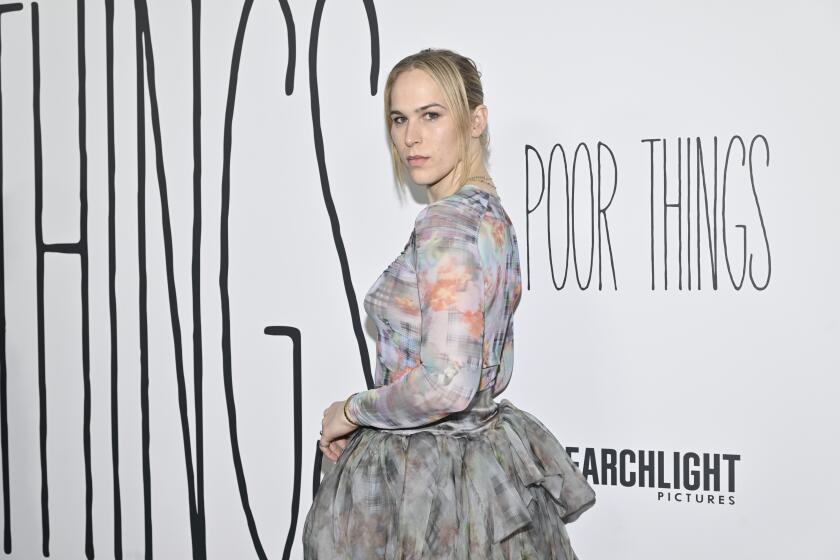Laughs from across the pond
In this new network fall season, you might say the British are coming. Two popular comedies from England have been adapted with American casts in an attempt to repeat their success Stateside. It won’t be easy.
“Coupling” and “The Ortegas” will be navigating difficult territory. Despite a common language, British and American culture is hugely different; there’s no guarantee that punch lines, gags and situations that trigger laughs in one country will be a source of hilarity in the other.
“Coupling,” premiering tonight on NBC, is a sitcom that sounds not unlike “Friends”; it has six youngish characters (three men and three women) involved in a variety of romantic and sexual permutations. But its characters are more prickly and less cozy than their “Friends” counterparts. And the humor in “Coupling” is more risque, just as the comic situations and dialogue are more sexually suggestive.
“The Ortegas,” which debuts Nov. 2 on Fox, is part talk show, part sitcom. An affluent Mexican American family living in the Valley builds a talk-show studio at home to indulge an inept son’s show business ambitions. He hosts the show, and real-life celebrities arrive as his guests. On the talk show his parents and grandmother, seated side by side on a sofa, upstage him by quizzing the celebs teasingly.
“Coupling” (its original title in Britain) will closely adhere in its first few episodes to the original BBC scripts by its creator, Steven Moffat. The American characters have the same names and characteristics as their British counterparts. “You could work out from the [NBC] publicity photos who’s playing who,” said Moffat.
“The Ortegas” is the result of a more radical adaptation. In the U.K., its prototype BBC show, “The Kumars at No. 42,” involves an Anglo-Indian family; the largest immigrant groups in Britain are from the Indian subcontinent, and Indian culture (including music, fashion and cuisine) has had a major effect on mainstream British life. But Fox decided to make the family Latino.
A successful transition from Britain to America is possible. So argues Denise O’Donoghue, joint chief executive at the British company that produces “The Kumars at No. 42.” Moffat and his fellow executive producer and wife, Sue Vertue, agree. “We can say to [network executives]: ‘This has worked before,’ ” said Vertue. (She and Moffat claim that “Coupling” is loosely based on their own courtship and their real-life relationship with a group of friends.) “We can say, ‘Trust us, this is funny.’ I said to them only last week, ‘I suppose the temptation is to turn this into every other [network] sitcom. Well, don’t.’ ”
If that sounds triumphalist, it may be because the British TV industry is feeling bullish. In recent years the U.K. has spawned such U.S. successes as “Who Wants to Be a Millionaire,” “The Weakest Link” and “American Idol” (the latter under its original title “Pop Idol”).
Yet none of those shows was scripted, and successfully adapting a comedy hit for American audiences is tougher.
One of the most successful British sitcoms in recent years, “Men Behaving Badly,” simply failed to translate when it was adapted for America and aired on NBC. “I’m not sure the network ever understood the concept of these two men being friends and living together,” said Vertue.
Other failures were even more embarrassing. John Cleese’s classic BBC sitcom “Fawlty Towers,” in which he played a buffoonish hotel owner, was adapted as “Amanda’s” in 1983, with Bea Arthur, of all people, in Cleese’s role. The series bombed.
NBC executives, who’ve not been shy about declaring “Coupling” as the eventual successor to the mighty “Friends,” is banking on comparable success for the new show by allowing Moffat’s early scripts to stand virtually untouched. “So far, and I emphasize ‘so far,’ the tone and style haven’t changed much at all,” he said. “The major difference is we’re having to take eight minutes out of a half-hour show for commercial breaks, and that’s painful.”
However, Moffat is now back in Britain, writing a fourth season of “Coupling” for the BBC, to air next year. In his absence, a team of American writers, headed by Phoef Sutton (who ran “Cheers” for several years), will gradually take over the scripts of the American show.
“We’ll be diverging,” said Sutton, speaking by telephone. “We’ll be using Steven’s scripts but interspersing new episodes all along, so it becomes its own show eventually.”
Sutton can see no reason why the cultural barriers that separate British and American humor should pose a problem for “Coupling” in the States. When he has tweaked Moffat’s scripts, he explained, “sometimes it’s an issue of cadence, other times it’s just the odd word. We don’t go to ‘the loo,’ we go to the bathroom.
“But often the [British] cadence gives an original feel to a joke. In American writing the joke is often at the end of a sentence.
“In Britain the funny word is often the third from the end, so you trail into a laugh. It just feels like you’re not always going for a joke. It’s a little bit smarter.”
Because of the British dialogue, Sutton admitted that casting “Coupling” was tough: “You need people who are good with words, who can speak well and are interested in the ideas of what they’re saying. They need to be good with complicated thoughts.”
O’Donoghue conceded that more changes were needed to transform the Anglo-Indian Kumars into the Latino Ortegas. She insisted that the essence of the show should not be tampered with or diluted: “What makes this show is that it’s a hybrid sitcom-talk show -- the sitcom part is about the family, and the talk show is the guests being interviewed in a totally spontaneous, unrehearsed way. That’s for real. You couldn’t direct that degree of surprise.”
Indeed, in the pilot of “The Ortegas,” comedian Howie Mandel reacts with hilarity to the dumb, often irreverent questions thrown at him by members of the Ortega family -- young host Alejandro (Al Madrigal) and his parents and grandmother, who sit on a sofa while the talk show is broadcast. The other guest, actress Denise Richards, looks bemused to the point of mild panic.
“Guests who come along and want to have a laugh come out of it very well, because the ‘family’ is very kind to them,” O’Donoghue said. “Seeing celebrities not doing their celebrity shtick for once is incredibly joyous for people watching at home.”
Though there is less buzz about “The Ortegas” than “Coupling” in the States, foreign sales for “The Kumars at No. 42” indicate that the show is an ideal template for countries with significant immigrant populations. Its Australian version, which is already airing, is called “Greeks on the Roof” (the family lives in a high-rise Melbourne apartment). Dutch and German versions are being developed, while broadcasters in Italy and Israel have bought the show.
Both “Coupling” and “The Kumars at No. 42” worked in Britain -- though, intriguingly, neither is a huge hit. Can their adapted versions work in America? The next few weeks will tell. Everyone concerned is optimistic, though Moffat notes, “I don’t know what percentage of sitcoms fail. I imagine it’s frighteningly high.”
It is. As they say in Britain: “blimey.” But as they say at the U.S. networks: If these don’t work, there’s always another reality show.
The complete guide to home viewing
Get Screen Gab for everything about the TV shows and streaming movies everyone’s talking about.
You may occasionally receive promotional content from the Los Angeles Times.



